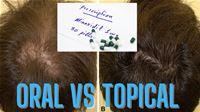Oral Minoxidil was the first medication to be approved by the FDA to treat androgenic alopecia (genetic hair loss). Most people commonly know minoxidil by the brand name Rogaine. However, the vast majority are unaware that the topical medication was first discovered through the oral version prescribed to treat hypertension. Recently, several studies conducted show the oral version in low doses is well-tolerated.
Topical Minoxidil vs Oral Minoxidil Study
In a recent study published in the Journal of the American Academy of Dermatology, a 24-week randomized study was done on fifty-two women suffering from female pattern hair loss. The treatment was randomized, and the women were given 1 mg of oral minoxidil or 5 % of topical minoxidil. The end goal of the study was to compare the overall density. After 24 weeks of treatment, they found that the total hair density increased by 12% in women taking the oral medication and 6% respectively in women taking the medication topically.
To date, this has been the only study comparing the topical version to the oral one. The study showed that the baseline for total hair per square centimeter (cm2) in the oral minoxidil group was 164.6. At the end of the 24 weeks, oral minoxidil total hair had gone up to 184.7 per cm2. The baseline in the topical minoxidil group was 163.2 hairs per cm2, and at the end of the 24-week trial, it went up to 176.3 hairs per cm2.
Oral Minoxidil Response Rates and Side Effects
The main concern for many considering switching from the topical to the oral version is the side effects. The previous studies which researched dosages of 5 mg had high rates of adverse reactions. The graph below shows that even a small dosage of minoxidil works well, but a dosage of 2.5 mg is almost as effective as the 5mg dose, but the incidence of adverse reactions is significantly lower.
Topical Minoxidil is safer; there is no denying that the adverse reactions are almost non-existent. Even for those who do get side effects report, the adverse reactions are usually mild. The real question is whether the oral medication is worth risking over the topical. To date, there is only one study that compared the oral version to the topical version. However, many hair transplant surgeons have reported seeing big improvements from their patients who switched from the topical to the oral version. These statements, of course, are anecdotal.
Conclusion
Minoxidil has been around for decades and has been proven to be safe and effective in topical form. The oral version hasn't been used as much. Still, more hair restoration physicians are starting to prescribe it, particularly in women, as they cannot take Propecia (finasteride), the most effective drug on the market to combat genetic hair loss. Based on the clinical data, it may be worth discussing with your physician. Even at a small dose, it's effective. If well-tolerated, it could prove to be a significant weapon in your arsenal against male and female pattern baldness.

